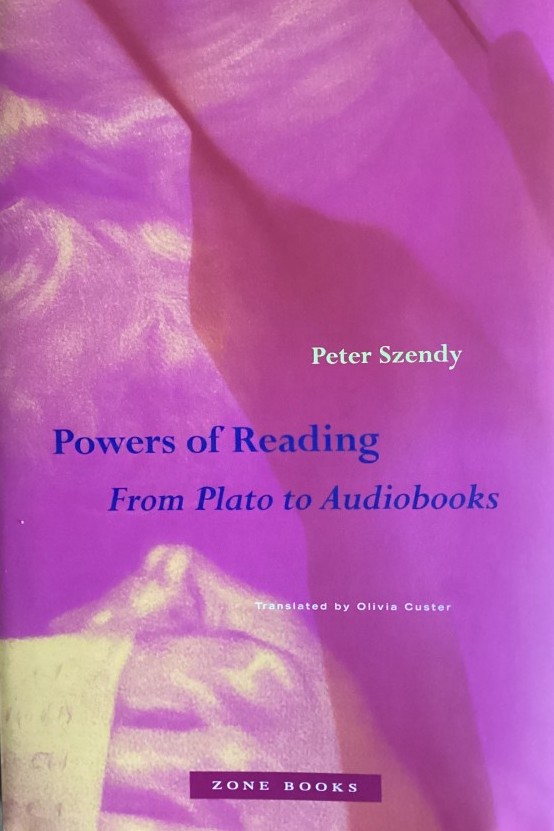Inspiring Older Readers
 posted on 29 May 2025
posted on 29 May 2025
Powers of Reading: From Plato to Audiobooks by Peter Szendy
Peter Szendy, a French philosopher and musicologist, is the David Herlihy Professor of Humanities and Comparative Literature at Brown University who has previously published Listen, A History of Our Ears which was translated into English in 2008. In that book he asked what it means to be a ‘listener’ but in this current publication (translated by Olivia Custer) he asks what it means to be a reader. He comes at this question from some interesting and, I think, unorthodox positions. I’m rather used to people asking the question ‘why do you read?’ or ‘what do you read for?’ but Szendy asks the question, ‘who are you reading for?’.
This, of course, raises the issue of reading aloud – something Szendy thinks of as reading’s ‘natural state’ as it were. Unless we have a very specific audience in mind to ‘perform’ to, we have tended to think of reading aloud as something to train ourselves out of – I still remember a childhood at school where teachers were constantly reminding me to ‘read quietly’, to read without vocalising the words on the page. But, Szendy claims, there is always an audience for our reading – a figure he calls ‘the readee’. When we move from reading aloud to reading silently, the ‘readee’ ceases to be an audience in the outside world and becomes the audience inside - ourselves.
This idea that our reading is always for someone (even if that someone is yourself), is, perhaps, part of the answer to why the popularity of audiobooks has grown exponentially in recent years. The fact that people seem to be comfortable with the idea that being read to is the same as doing the reading yourself attests to the complexity that exists between the reader and the readee. For what it’s worth however, I’m still firmly in the camp that believes being read to is a very different experience to doing the reading. I think we need to ask whether the act of reading is simply an engagement with the words that have been written or something more than that – also a relationship with the book itself as a physical and sensory object. This, of course, takes us into considering the problematic interaction between the reader and various manifestations of new technology that completely change that physicality.
I very much enjoyed Szendy introducing me to the idea of ‘the reading slave’ who was part of the Classical world (referenced by Plato and Cicero amongst others) and would read aloud to their owners:
“Some of these slaves apparently did much more than lend their voice to the text. They were real living archives, a little like in Ray Bradbury’s Fahrenheit 451, where books that are threatened with destruction and at risk of being forgotten survive because some people have learned them by heart.”
Szendy also raises the interesting notion of reading as ‘punishment’ and what he refers to as ‘the imperative to read’. In an interview between the author and Juliette Cerf, carried on the Princeton University Press website, he described it in this way:
“The reading imperative then acquires the nature of a categorical imperative; it says: read whatever happens, read for the sake of reading, read regardless of what you read, in spite of what you read, even if it is unreadable. . . . The purest form that the reading imperative can take is maybe when people are sentenced to read books, as it happened in a number of legal cases that I refer to (see for example the verdict reported in The Guardian, on February 7, 2017: “Vandals sentenced to read books about racism and antisemitism”).”
This isn’t a long book but it is a book dense with ideas and often with complex lines of argument that, I will admit, I sometimes had to retrace several times in order to stay with the arguments. But it is, to be fair, a book aimed at the academic audience rather than the casual lay reader and any scholar of the future of books, the nature of the reading experience and who is seeking a sometimes more playful set of perspectives will find plenty to keep them going.
Available now from Princeton University Press, you will be able to get your copy from your local independent bookshop – who will be glad to order you a copy if they don’t have it on their shelves.
Terry Potter
May 2025